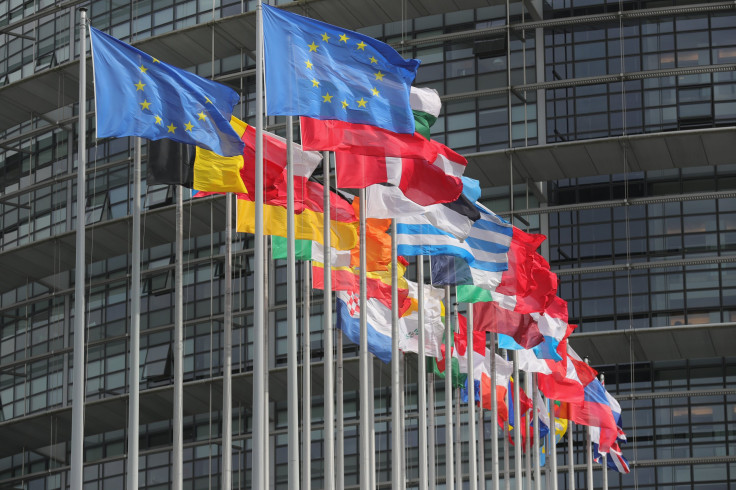China’s Elite ‘Anxious Over Political Consequences’ Of Brexit, Fear It Could Accelerate EU ‘Disintegration’: State Media

SHANGHAI — A commentary in a leading Chinese newspaper has said Britain's exit from the European Union could lead to a decline in the influence of both the U.K. and the EU, and "cast a shadow" on China's trade ties with the EU. And it said that China’s political elites were “anxious over the political consequences” of a 'Yes' vote in Thursday’s referendum.
The article, in the official Global Times, said China wanted to see a "united and strong" EU, which would “regain its former glory and influence … rather than a fragile one weakened by Brexit.”
It said a divided Europe was bound to have limited leverage, and suggested that the U.K. “breaking up with the EU will inevitably accelerate the latter's disintegration.” Indeed, it warned, “European political civilization might face a breakdown, which will strike a heavy blow to both Britain and the EU's global status as well as to their international influence.”
China’s leaders have not commented in great detail on the U.K'.s referendum, but have said on several occasions that they hope Britain will remain a member of the European Union. And the Global Times gave some hint of China’s concerns, suggesting Beijing feared that a weakened EU would be less of a counterbalance to the power of the U.S., at a time when tensions between China and Washington are on the rise, over issues including China's island reclamation in the South China Sea.
“A multipolar world requires more powers, which are independent of the U.S., to participate in international governance,” it said. “The EU is supposed to be one of them.”
Yet the paper also said interest in the referendum among ordinary Chinese people appeared to be relatively limited: it noted that the topic Brexit had only received around 2.7 million views on China’s Twitter-like Sina weibo network, a mere 1 percent of the number who had viewed the topic “U.S. election."
It said this suggested that the average citizen either did not fully understand the significance of the U.K. quitting the EU – or simply felt that European influence on China was less than that of the U.S. It also quoted one Chinese poll showing that 72 percent of respondents supported a Brexit. It said this likely reflected “dissatisfaction toward Brussels for the latter's protectionist measures against Beijing.” The EU has recently refused to grant China market economic status, despite Britain’s support for granting this, leaving China open to European anti-dumping sanctions, including against its steel producers
And some experts say that Chinese homebuyers, who have invested in London and a number of other British cities in recent years, would not be put off by a departure from the EU, since many are primarily motivated by sending their children to study in Britain.
Nevertheless, big Chinese businesses, which have been on something of a buying spree of British companies — the U.K. is now China’s second-largest investment destination in Europe after Italy — appear more anxious about the potential impact on their businesses. China’s richest man, Wanda group head Wang Jianlin, who has invested in British property, said earlier this year that a British departure from the EU “would create more obstacles and challenges for investors.”
And the Global Times said China’s “political elites” were anxious. It cited concerns from academics over the potential impact of a U.K. departure on global financial markets, with some wondering whether it would “wipe away Britain's advantage of being a gateway into European market.”
However, another commentary in the same paper’s business section cited the decisions by Hong Kong tycoon Li Ka-shing, a major investor in China over the past two decades, to move some of his assets from Asia to the U.K. in recent years, and to keep them there despite the referendum, as a sign of confidence that the U.K. would remain in the EU.
It added that the impact on Asia of a Brexit would be relatively limited in terms of trade, since Asian exports to the U.K. accounted for just 0.7 percent of the region’s GDP.
But it warned that Asian economies could be hard-hit by the depreciation in the pound that many economists expect if Britain votes to quit the EU. It said this would lead some “investment in Asia to withdraw from the region toward havens, leading to enormous capital outflows from certain Asian countries and subsequently depreciation of those Asian countries' currencies.”
At the same time, the article speculated that there could be a silver lining for China in a British departure from the EU: it said this “could prompt the country to be more inclined to cooperate with China” in a range of fields, including the financial sector.
It noted that “the U.K. was the first Western country to issue yuan-denominated sovereign debt in 2014, and the People's Bank of China also issued its first offshore yuan-denominated note," worth up to 5 billion yuan ($788 million) in London, during President Xi Jinping's visit to the U.K. last year.
The article argued that, if Britain left the EU, restrictions imposed on the country’s financial sector by the EU might be loosened, and this could boost financing for Chinese investment projects, including the country’s “Belt and Road” strategy of expanding its trade and investment with countries in Asia and Europe.
Nevertheless, many in China’s establishment may be hoping that the viability of these optimistic predictions is not put to the test in practice.
© Copyright IBTimes 2025. All rights reserved.






















